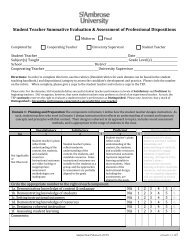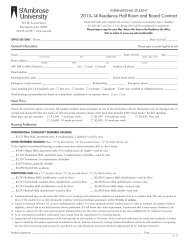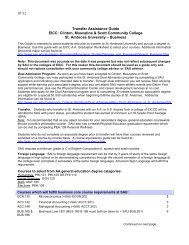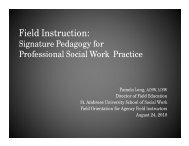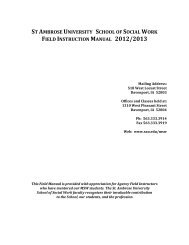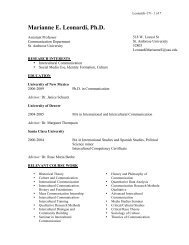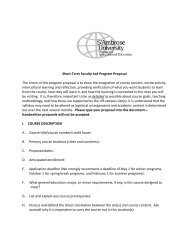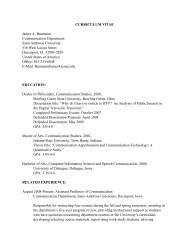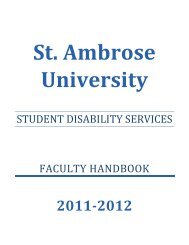Practice Behaviors and Competency Outcomes for School of Social ...
Practice Behaviors and Competency Outcomes for School of Social ...
Practice Behaviors and Competency Outcomes for School of Social ...
You also want an ePaper? Increase the reach of your titles
YUMPU automatically turns print PDFs into web optimized ePapers that Google loves.
Human<br />
Rights <strong>and</strong><br />
Justice<br />
2.1.5 Advance<br />
human rights<br />
<strong>and</strong> social<br />
justice.<br />
Each person, regardless <strong>of</strong> position in society, has basic human<br />
rights, such as freedom, safety, privacy, an adequate st<strong>and</strong>ard <strong>of</strong><br />
living, health care, <strong>and</strong> education. <strong>Social</strong> workers recognize the<br />
global interconnections <strong>of</strong> oppression <strong>and</strong> are knowledgeable<br />
about theories <strong>of</strong> justice <strong>and</strong> strategies to promote<br />
human <strong>and</strong> civil rights. <strong>Social</strong> work incorporates social justice<br />
practices in organizations, institutions, <strong>and</strong> society to ensure that<br />
these basic human rights are distributed equitably <strong>and</strong> without<br />
prejudice.<br />
<strong>Social</strong> workers<br />
a) identify the inequities in human rights af<strong>for</strong>ded to various<br />
people<br />
b) assess the <strong>for</strong>ms <strong>and</strong> mechanisms maintaining oppression<br />
at individual, social, <strong>and</strong> institutional levels<br />
c) engage in practices advancing human rights <strong>and</strong> social<br />
justice<br />
As social work pr<strong>of</strong>essionals, all practitioners commit themselves to<br />
advancing human rights <strong>and</strong> social justice. An empowerment-oriented<br />
practitioner frames this ef<strong>for</strong>t in terms <strong>of</strong> client’s power. One’s sense<br />
<strong>of</strong> power can only endure in an environment that supports it.<br />
Empowering practitioners analyze the ways in which a client’s<br />
experience <strong>of</strong> power is shaped by social <strong>and</strong> cultural systems, social<br />
policy, legislation, agency protocols, <strong>and</strong> global dynamics. In keeping<br />
with the goal <strong>of</strong> empowerment, practitioners act on this knowledge to<br />
contribute to a socially just society.<br />
Empowerment social workers<br />
d) work individually <strong>and</strong> collectively to advocate policies<br />
supporting social justice <strong>and</strong> protecting human rights<br />
Research-<br />
Based<br />
<strong>Practice</strong><br />
2.1.6 Engage in<br />
researchin<strong>for</strong>med<br />
practice <strong>and</strong><br />
practicein<strong>for</strong>med<br />
research.<br />
<strong>Social</strong> workers utilize practice experience to in<strong>for</strong>m research,<br />
employ evidence-based interventions, evaluate their own<br />
practice, <strong>and</strong> use research findings to improve practice, policy,<br />
<strong>and</strong> social service delivery. <strong>Social</strong> workers comprehend<br />
quantitative <strong>and</strong> qualitative research <strong>and</strong> underst<strong>and</strong> scientific<br />
<strong>and</strong> ethical approaches to building knowledge.<br />
<strong>Social</strong> workers<br />
a) evaluate practice experience to improve practice<br />
outcomes<br />
b) critically apply evidence-based data to guide practice<br />
c) use qualitative <strong>and</strong> quantitative research <strong>and</strong> evaluation<br />
to improve service delivery<br />
A distinguishing quality <strong>of</strong> empowerment practice is the use <strong>of</strong><br />
“evidence” from a client’s perspective in balance with knowledge <strong>and</strong><br />
evidence generated through social work research. “What constitutes<br />
valid evidence?” is a critical question in the use <strong>of</strong> evidence to guide<br />
social work practice, prompting workers to critically evaluate new<br />
knowledge <strong>and</strong> its sources <strong>for</strong> credibility <strong>and</strong> applicability in each<br />
unique practice situation. Empowering workers continuously evaluate<br />
their practices through the lens <strong>of</strong> new knowledge <strong>and</strong> by accessing<br />
voices from clients, colleagues, <strong>and</strong> other stakeholders.<br />
Empowerment social workers<br />
d) tailor evidence-supported strategies to fit unique client<br />
situations<br />
e) design, implement, <strong>and</strong> analyze program evaluations that<br />
access stakeholders’ views




